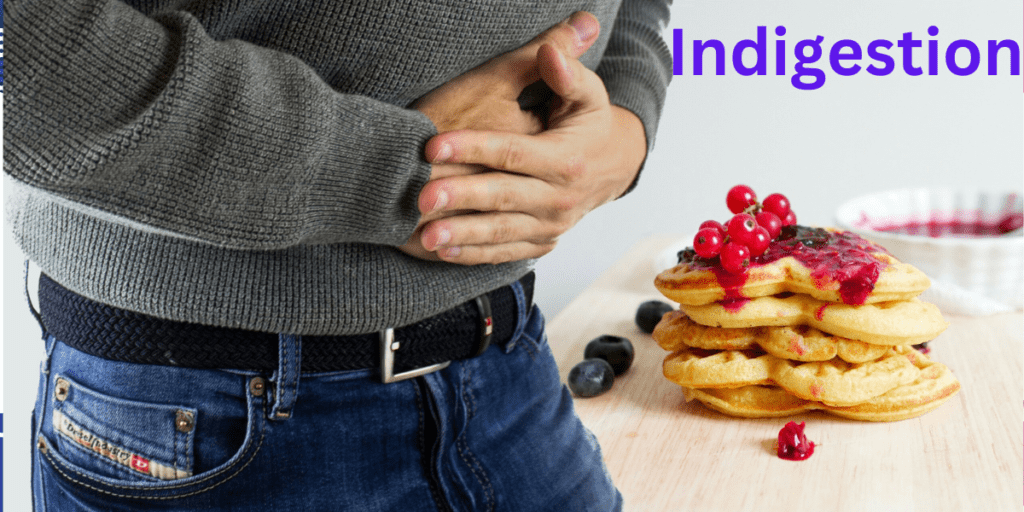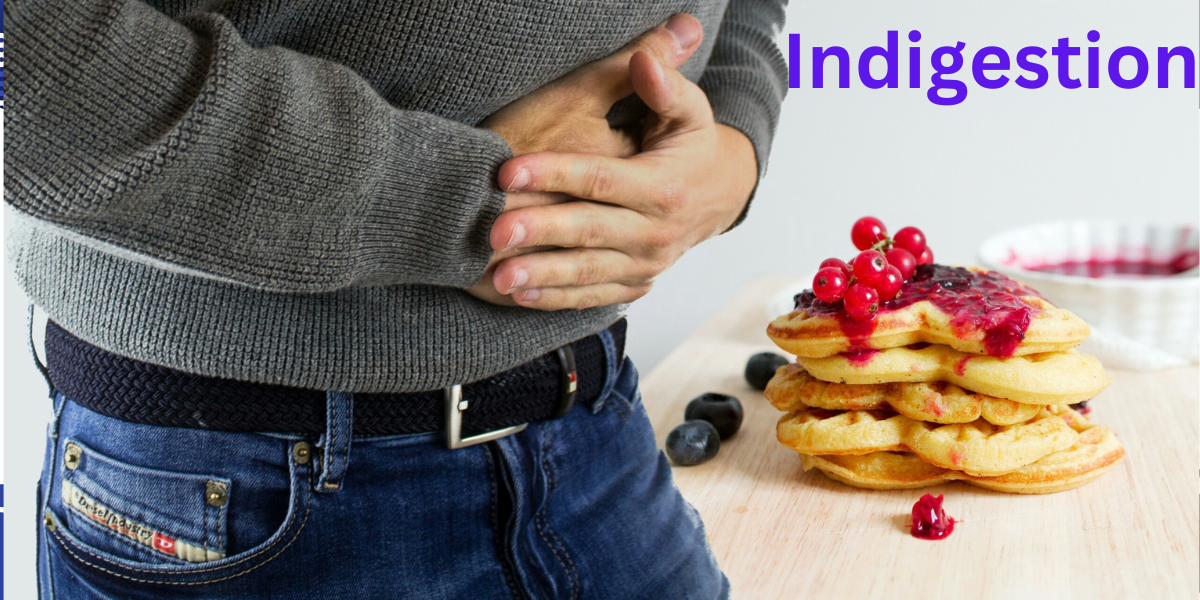Indigestion, also known as dyspepsia, is a common digestive problem that affects millions of people worldwide. It is characterized by discomfort or pain in the upper abdomen, along with symptoms such as bloating, nausea, and feeling full even after eating a small amount of food. Indigestion can be caused by a range of factors, including overeating, eating too quickly, consuming spicy or fatty foods, drinking alcohol or caffeine, stress, and certain medications.
While indigestion is often a mild and temporary condition, it can be a chronic problem for some people and may require medical intervention. Treatment options include lifestyle changes, medication, and in some cases, surgery.but in todays world it is major question how do you stop indigestion. In this blog post we will discuss more about indigestion and also tell how do you stop indigestion at home .

What is indigestion ?
Indigestion, also called dyspepsia, is a condition that causes discomfort or pain in the upper abdomen, along with symptoms such as bloating, nausea, and feeling full after eating.
Read more.. relieveanxiety depression stress management hair fall care tips split ends
Symptoms of Indigestion
The symptoms of indigestion may vary from person to person, but commonly include:
• Abdominal pain or discomfort in the upper abdomen
• Feeling of fullness or bloating after eating a meal
• Nausea or vomiting
• Belching or flatulence
• Heartburn or acid reflux
• Loss of appetite
• Fatigue or weakness
• Unintentional weight loss
• Diarrhea or constipation
• Regurgitation of food or sour liquid into the mouth.
These symptoms can occur occasionally or persistently and may be triggered by certain foods, eating habits, or lifestyle factors. If you experience severe or prolonged symptoms, it is important to seek medical attention to rule out any underlying medical conditions.
Causes of Indigestion
Indigestion is a common digestive problem that can be caused by various factors. It occurs when the digestive system is unable to break down and absorb food properly, leading to discomfort or pain in the upper abdomen, bloating, and other symptoms. The following are some of the most common causes of indigestion:
1.Overeating: One of the primary causes of indigestion is overeating. When you eat too much, the stomach becomes overfilled, leading to bloating, discomfort, and sometimes pain. Eating too quickly can also lead to indigestion.
2.Spicy and fatty foods: Spicy and fatty foods are known to irritate the stomach lining, leading to indigestion. These foods can also cause acid reflux, which is a common cause of indigestion.
3.Caffeine: Caffeine is a stimulant that can cause the muscles in the digestive tract to relax, leading to indigestion. It can also increase stomach acid production, which can cause acid reflux.
4.Alcohol: Drinking alcohol can irritate the stomach lining and lead to indigestion. It can also relax the muscles in the digestive tract, causing acid reflux. To Stop indigestion itis necessary to leave alcohol.
5.Smoking: Smoking can irritate the lining of the stomach and increase stomach acid production, leading to indigestion. It can also cause the muscles in the digestive tract to relax, causing acid reflux.
6.Stress: Stress can affect the digestive system, causing it to slow down or become overactive, leading to indigestion. It can also cause the muscles in the digestive tract to contract, leading to discomfort and pain.
7.Medications: Certain medications, such as nonsteroidal anti-inflammatory drugs (NSAIDs), antibiotics, and steroids, can irritate the stomach lining and cause indigestion. They can also slow down the digestive system, leading to bloating and discomfort.
8.Medical conditions: Some medical conditions, such as gastroesophageal reflux disease (GERD), peptic ulcers, and gallstones, can cause indigestion. These conditions can cause inflammation or blockages in the digestive system, leading to discomfort and pain.
9.Infections: Infections caused by bacteria, viruses, or parasites can irritate the digestive system and lead to indigestion. They can also cause inflammation in the digestive tract, leading to discomfort and pain.
10.Food intolerances: Food intolerances, such as lactose intolerance or gluten intolerance, can cause indigestion. These conditions occur when the body is unable to digest certain foods, leading to bloating, discomfort, and sometimes pain.
In summary, indigestion can be caused by a range of factors, including overeating, consuming spicy or fatty foods, caffeine, alcohol, smoking, stress, certain medications, medical conditions, infections, and food intolerances. Identifying the underlying cause of indigestion is important for effective treatment and management of symptoms.
Diagnosis of Indigestion
The diagnosis of indigestion typically involves a combination of medical history, physical examination, and diagnostic tests. The following are some of the most common methods used to diagnose indigestion:
1.Medical history: The doctor will ask about your symptoms, eating habits, and medical history to determine the possible causes of your indigestion. They may also ask about any medications you are taking and whether you have a history of digestive problems.
2.Physical examination: The doctor will perform a physical exam to check for any signs of digestive problems, such as bloating, tenderness in the abdomen, or abnormal bowel sounds.
3.Laboratory tests: The doctor may order blood tests or stool tests to check for signs of inflammation, infection, or other medical conditions that may be causing your indigestion.
4.Imaging tests: Imaging tests, such as X-rays, ultrasound, or CT scans, may be used to check for abnormalities in the digestive tract, such as inflammation, blockages, or structural abnormalities.
5.Endoscopy: Endoscopy is a procedure that involves inserting a flexible tube with a camera into the digestive tract to check for abnormalities, such as inflammation, ulcers, or tumors. During the procedure, the doctor may also take a tissue sample (biopsy) for further analysis.
6.pH monitoring: pH monitoring is a test that involves inserting a thin tube through the nose into the esophagus to measure the amount of acid that flows back into the esophagus from the stomach. This test is useful in diagnosing gastroesophageal reflux disease (GERD), which is a common cause of indigestion.
The diagnosis of indigestion can be challenging, as the symptoms can be caused by a range of factors. Identifying the underlying cause of indigestion is important for effective treatment and management of symptoms. It is important to seek medical attention if you experience severe or persistent symptoms, as they may be a sign of a more serious medical condition.
(How Do You Stop Indigestion)
Treatment of indigestion
The treatment of indigestion depends on the underlying cause of the symptoms. In many cases, mild indigestion can be treated with simple lifestyle changes and over-the-counter medications. However, more severe cases may require prescription medications or other medical interventions. The following are some of the most common treatments for indigestion:
1.Lifestyle changes: Simple lifestyle changes, such as eating smaller meals more frequently, avoiding spicy and fatty foods, reducing caffeine and alcohol intake, and quitting smoking, can help reduce symptoms of indigestion.
2.Over-the-counter medications: Antacids, such as Tums or Maalox, can help neutralize stomach acid and reduce symptoms of indigestion. H2 blockers, such as Pepcid or Zantac, can also reduce stomach acid production and relieve symptoms. Proton pump inhibitors (PPIs), such as Nexium or Prilosec, can provide longer-lasting relief by blocking stomach acid production.
3.Prescription medications: If lifestyle changes and over-the-counter medications do not provide relief, the doctor may prescribe stronger medications, such as PPIs or prokinetics, which help to move food through the digestive tract more quickly.
4.Surgery: In some cases, surgery may be necessary to treat the underlying cause of indigestion, such as a blockage in the digestive tract or a hernia.
5.Management of underlying medical conditions: If the indigestion is caused by an underlying medical condition, such as GERD or peptic ulcers, treating the underlying condition is necessary to relieve symptoms of indigestion.
6.Psychological therapies: For some people, indigestion may be caused or exacerbated by stress or anxiety. In these cases, psychological therapies, such as cognitive behavioral therapy or relaxation techniques, may be helpful in reducing symptoms.
It is important to work with a healthcare provider to determine the most appropriate treatment for your individual case of indigestion. In addition to medical treatment, lifestyle changes, such as maintaining a healthy diet and exercise routine, can help prevent indigestion and improve overall digestive health.
10 Home remedies for indigestion
1.Ginger: Ginger has natural anti-inflammatory properties that can help reduce inflammation and irritation in the digestive tract. Drinking ginger tea or chewing on ginger root can help relieve symptoms of indigestion.It will help to stop Indigestion.
2.Peppermint: Peppermint has natural soothing properties that can help relax the muscles of the digestive tract and reduce symptoms of indigestion. Drinking peppermint tea or taking peppermint supplements can be helpful..It will also help to stop Indigestion.
3.Chamomile: Chamomile has natural calming properties that can help reduce inflammation and irritation in the digestive tract. Drinking chamomile tea can be helpful to stop indigestion.
4.Baking soda: Baking soda can help neutralize stomach acid and reduce symptoms of indigestion. Mix a teaspoon of baking soda with a glass of water and drink it slowly to relieve symptoms.
5.Apple cider vinegar: Apple cider vinegar can help to stop indigestion and reduce symptoms of indigestion. Mix a tablespoon of apple cider vinegar with a glass of water and drink it before meals to prevent or stop indigestion.
6.Fennel: Fennel seeds have natural digestive properties that can help to stop indigestion. Chewing on fennel seeds after meals can be helpful.
7.Aloe vera juice: Aloe vera juice can help reduce inflammation and irritation in the digestive tract, which can help relieve symptoms of indigestion. Drink a small amount of aloe vera juice before meals to prevent or stop indigestion.
8.Cumin: Cumin seeds have natural digestive properties that can help relieve symptoms of indigestion. Roast cumin seeds and mix with water to make a tea, or add cumin powder to your food to stop indigestion.
9.Lemon water: Drinking lemon water can help stimulate digestion and reduce symptoms of indigestion. Squeeze fresh lemon juice into a glass of water and drink it before meals to prevent or stop indigestion.
10.Carom seeds: Carom seeds, also known as ajwain, have natural digestive properties that can help relieve symptoms of indigestion. Mix carom seeds with water to make a tea, or add carom seeds to your food to help stop indigestion.
We should remember that home remedies should not be used as a substitute for medical treatment, especially in cases of severe or persistent indigestion. If you experience severe or persistent symptoms of indigestion, it is important to seek medical attention to determine the underlying cause and appropriate treatment.
When to call the doctor in indigestion
While most cases of indigestion can be managed with home remedies or over-the-counter medications, there are some situations where it is important to call a doctor:
1.Severe or persistent symptoms: If you experience severe or persistent symptoms of indigestion, such as vomiting, severe abdominal pain, or difficulty swallowing, it is important to seek medical attention. These symptoms could be a sign of a more serious underlying condition, such as an ulcer or gastroesophageal reflux disease (GERD).
2.Blood in vomit or stool: If you notice blood in your vomit or stool, it is important to seek medical attention right away. This could be a sign of a serious gastrointestinal condition, such as a bleeding ulcer or cancer.
3.Difficulty breathing: If you experience difficulty breathing or chest pain along with your symptoms of indigestion, it could be a sign of a heart attack. Seek medical attention immediately.
4.Persistent weight loss: If you have been experiencing persistent weight loss along with your symptoms of indigestion, it could be a sign of a more serious underlying condition. See a doctor to determine the cause.
5.Family history of gastrointestinal conditions: If you have a family history of gastrointestinal conditions such as colon cancer, it is important to see a doctor regularly to monitor your digestive health and screen for any potential issues.
It is always better to err on the side of caution when it comes to your health. If you are unsure whether you should seek medical attention for your symptoms of indigestion, it is always a good idea to consult with a healthcare provider.
Conclusion
In conclusion, indigestion is a common digestive problem that can cause discomfort and a range of symptoms, including bloating, nausea, and abdominal pain. While the exact causes of indigestion can vary, common triggers include overeating, eating too quickly, and consuming spicy or fatty foods. In most cases, indigestion can be managed with home remedies or over-the-counter medications.
However, it is important to seek medical attention if you experience severe or persistent symptoms, blood in your vomit or stool, difficulty breathing, or persistent weight loss. By taking steps to manage your symptoms and addressing any underlying issues, you can reduce the impact of indigestion on your daily life and improve your overall digestive health.
Disclaimer: The advice and suggestions mentioned in the article are for general information purpose only and it should not be taken as professional medical advice. Always consult your doctor if you have any questions or concerns.
FAQ-
What acid reflux feels like?
Acid reflux feels like a burning sensation in the chest and throat caused by stomach acid flowing back up into the esophagus.
How do you get rid of acid reflux?
To get rid of acid reflux, you can try making lifestyle changes such as avoiding trigger foods, eating smaller meals, and not lying down immediately after eating. Additionally, you can try over-the-counter antacids or prescription medications that reduce the amount of acid produced in the stomach. In severe cases, surgery may be necessary.
What are Home remedies for acid reflux ?
There are several home remedies for acid reflux, including:Drinking ginger tea or chewing on ginger root Drinking aloe vera juice,Consuming apple cider vinegar in water,Eating bananas, oatmeal, and other foods that can neutralize stomach acid Elevating the head of your bed to prevent acid reflux while sleeping Avoiding trigger foods such as caffeine, spicy foods, and fatty foods.
How do you treat indigestion pain ?
To treat indigestion pain, you can try over-the-counter antacids or medications that neutralize stomach acid or reduce its production. Lifestyle changes such as eating smaller meals and avoiding trigger foods may also help alleviate symptoms.
How do I get rid of indigestion pain in my chest ?
To get rid of indigestion pain in your chest, you can try drinking water or a non-caffeinated beverage, taking an antacid, and avoiding lying down or exercising immediately after eating. If the pain is severe or persistent, seek medical attention to rule out more serious conditions.
How do you get rid of heart burn and nausea fast ?
To get rid of heartburn and nausea fast, you can try drinking ginger tea, taking an over-the-counter antacid, or eating small, bland meals. Avoiding trigger foods, such as spicy or fatty foods, can also help alleviate symptoms.




